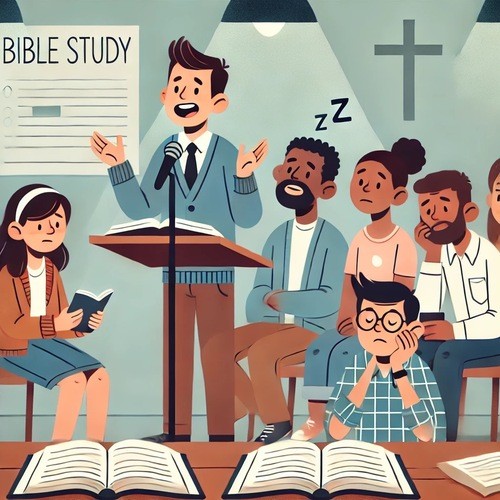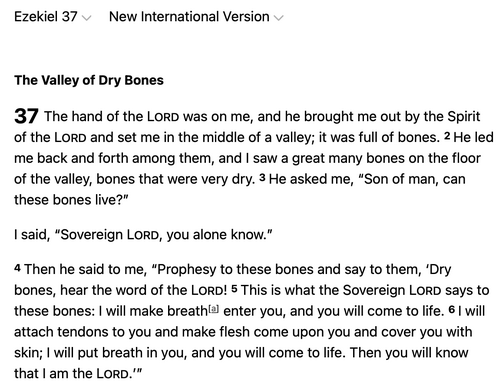The Story - Chapter 17
From 2013-15 I was a chaplain for a mental health nonprofit. In that role I did various bible studies with some of the most lovely people I will ever have the chance to share life with. This blog is based on one of those experiences.

I was leading a Bible study on forgiveness. As I spoke, the same four people stayed engaged, while the rest of the group drifted in and out—some listening, others distracted by their phones, a few even dozing off. We reached a good transition point, so I paused and asked if there were any questions before we continued.
That's when "Barbara" raised her hand.
That's when "Barbara" raised her hand.

This is an AI generated picture when I typed in "create a cartoon-type picture of a bible study where people aren't paying attention to the Bible study leader: some listening, others distracted by their phones, a few even dozing off"
Barbara never raises her hand. In fact, I’d never actually heard her speak. Before I could even call on her, she blurted out, “Yeah, but what about the things you’ve done that can’t be forgiven?”
Before I could gently ask for an example, she started sharing her story—condensed here for our purposes: years in and out of jail on drug charges, until finally being diagnosed and treated for mental illness.
“I’ve hurt people,” she admitted. “A lot of people.”
Later, after the group session ended, I approached Barbara to thank her for participating. She grinned and said, “Boy, Chaplain, you sure know how to get people talking!” Then she laughed—a deep, unexpected laugh. And just like that, she began to open up even more.
She told me about her son, “Brandon.” She had raised him alone in Little Rock, though she admitted she wasn’t much of a mother. Between jail time and chasing her next high, she was rarely there for him. When Brandon was in high school, there was a moment she became so angry she wanted to kill him.
I chuckled and said, “Yeah, teenagers can do that to the best of us.”
But Barbara’s face turned to stone.
“No, Chaplain. I got a knife out of the kitchen. I was screaming at him to get his (butt) out of the bathroom so I could kill him. He called a neighbor to get me out of the apartment so he could escape. I wanted to kill my boy.”
Before I could gently ask for an example, she started sharing her story—condensed here for our purposes: years in and out of jail on drug charges, until finally being diagnosed and treated for mental illness.
“I’ve hurt people,” she admitted. “A lot of people.”
Later, after the group session ended, I approached Barbara to thank her for participating. She grinned and said, “Boy, Chaplain, you sure know how to get people talking!” Then she laughed—a deep, unexpected laugh. And just like that, she began to open up even more.
She told me about her son, “Brandon.” She had raised him alone in Little Rock, though she admitted she wasn’t much of a mother. Between jail time and chasing her next high, she was rarely there for him. When Brandon was in high school, there was a moment she became so angry she wanted to kill him.
I chuckled and said, “Yeah, teenagers can do that to the best of us.”
But Barbara’s face turned to stone.
“No, Chaplain. I got a knife out of the kitchen. I was screaming at him to get his (butt) out of the bathroom so I could kill him. He called a neighbor to get me out of the apartment so he could escape. I wanted to kill my boy.”

She went on to tell me that Brandon had become a “chip off the old block”—in and out of prison, either chasing a high or waiting to chase it. She tried to tell him about what helped her, about how she found a way out, but he kept going back—to the same neighborhood, the same people, the same cycle.
“I can’t be forgiven for that (poop),” she said. But she didn’t say “poop.”
As I sat with Barbara, listening to a mother’s grief, seeing her dry bones laid bare, I didn’t have the strength or courage to prophesy to her. To give her hope. To tell her about the hope we have in Jesus.
I just stared at her dry bones.
But you know what happened?
God sent someone else.
“Sandy,” sitting a few feet away, scooted her chair closer and said, “Oh child, it’ll be okay.” And then she shared her own story—one so eerily similar to Barbara’s that I would have thought it was made up, if not for the tears in her eyes.
And then God sent someone else.
“Charles,” a gentle older man with one good eye, leaned in and shared his story. He had been exactly where Brandon was. “He has to hit rock bottom before he can even think about getting out,” he said. Then, with love in his voice, he added, “He may not make it out. You know that. But know that he can.”
“I can’t be forgiven for that (poop),” she said. But she didn’t say “poop.”
As I sat with Barbara, listening to a mother’s grief, seeing her dry bones laid bare, I didn’t have the strength or courage to prophesy to her. To give her hope. To tell her about the hope we have in Jesus.
I just stared at her dry bones.
But you know what happened?
God sent someone else.
“Sandy,” sitting a few feet away, scooted her chair closer and said, “Oh child, it’ll be okay.” And then she shared her own story—one so eerily similar to Barbara’s that I would have thought it was made up, if not for the tears in her eyes.
And then God sent someone else.
“Charles,” a gentle older man with one good eye, leaned in and shared his story. He had been exactly where Brandon was. “He has to hit rock bottom before he can even think about getting out,” he said. Then, with love in his voice, he added, “He may not make it out. You know that. But know that he can.”
That day, as God is my witness, I saw a valley of dry bones come back to life.

We’ve been there. Our friends, our family, our own lives. Maybe not in the exact way Barbara has… maybe even worse. We hear people today express the same despair that the exiled Hebrews must have felt:
- I feel spiritually dried up.
- I haven’t heard from God in years.
- My prayers feel like they never leave the room.
- I’d believe in God if He’d just show up for me—just this once.
These situations feel hopeless. No God. No end in sight.
And yet, those cries of the heart—those feelings of spiritual death—are actually signs of life.
Because in the place of death, Ezekiel knew that only God could bring life. When God commanded Ezekiel to prophesy—to speak—to the dead (page 246-7 in The Story), Ezekiel must have felt the same way we do sometimes: What good will it do? This is a hopeless situation!
But God still commanded Ezekiel…commands us…to offer Israel the promise of new life to a lifeless people. Hope again. Restoration. This was God’s work of re-creating Israel. And for us, the real hope of Jesus’s resurrection is the same: the promise of new life to a lifeless people. Hope again. Forgiveness. Reconciliation. Restoration.
And if you look, you’ll be able to see God’s promise of resurrection in your story: the promise of new life when you were lifeless. Forgiveness. Reconciliation. Restoration.
Don’t just stare at dry bones - proclaim the hope of resurrection in the new life you’ve experienced!
- I feel spiritually dried up.
- I haven’t heard from God in years.
- My prayers feel like they never leave the room.
- I’d believe in God if He’d just show up for me—just this once.
These situations feel hopeless. No God. No end in sight.
And yet, those cries of the heart—those feelings of spiritual death—are actually signs of life.
Because in the place of death, Ezekiel knew that only God could bring life. When God commanded Ezekiel to prophesy—to speak—to the dead (page 246-7 in The Story), Ezekiel must have felt the same way we do sometimes: What good will it do? This is a hopeless situation!
But God still commanded Ezekiel…commands us…to offer Israel the promise of new life to a lifeless people. Hope again. Restoration. This was God’s work of re-creating Israel. And for us, the real hope of Jesus’s resurrection is the same: the promise of new life to a lifeless people. Hope again. Forgiveness. Reconciliation. Restoration.
And if you look, you’ll be able to see God’s promise of resurrection in your story: the promise of new life when you were lifeless. Forgiveness. Reconciliation. Restoration.
Don’t just stare at dry bones - proclaim the hope of resurrection in the new life you’ve experienced!

Recent
Archive
2025
January
2024
August
October
Categories
no categories

No Comments